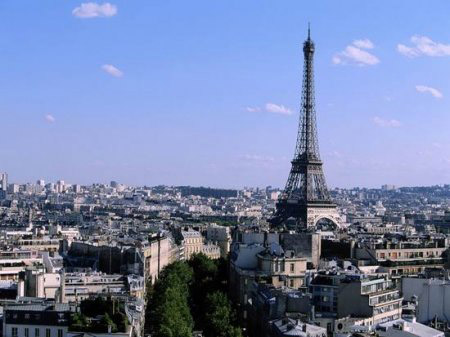Azerbaijan, Baku, March 11 / Trend E. Tariverdiyeva /
France and Russia have few levers for rapid resolving of the Nagorno-Karabakh conflict, despite the similarity of views on this issue, experts say.
"It is one of those non-conflict topics, where there is convergence of views between Moscow and Paris, head of Russian, Eurasian trend and International Energy Security at the Heritage Foundation (USA), political analyst Ariel Cohen told Trend . I do not see real levers of pressure on Armenia which Russia or France could propose to change the current strategic position of the parties. Such a statement does not change the status quo. Such a declaration will not change the position of Yerevan.
Paris has recently noticeably intensified efforts to resolve the Nagorno-Karabakh conflict.
France and Russia intend to continue to cooperate closely to resolve the situation in Nagorno-Karabakh, French President Nicolas Sarkozy said after talks with Russia's counterpart Dmitry Medvedev in late February.
During his visit to Paris, Azerbaijani Foreign Minister Elmar Mammadyarov met with French President Nicolas Sarkozy's chief foreign policy adviser Jean-David Levitte, Azerbaijani Foreign Ministry spokesman Elkhan Polukhov told Trend .
During the meeting they discussed the Armenian-Azerbaijani Nagorno-Karabakh conflict. Azerbaijani Foreign Minister informed French adviser about Azerbaijan's position.
French diplomat, in his turn, stressed French President Nicolas Sarkozy's promise, given at a recent meeting with Azerbaijani President Ilham Aliyev on his personal intervention in the matter and continuation of efforts to resolve the conflict, remains in force.
Yerevan and Baku must reach a compromise to resume the "peace dynamics" in the Nagorno- Karabakh problem, French President Nicolas Sarkozy said. On March 10 he expressed this opinion at the talks with the Armenian counterpart Serzh Sargsyan.
The conflict between the two South Caucasus countries began in 1988 when Armenia made territorial claims against Azerbaijan. Armenian armed forces have occupied 20 percent of Azerbaijan since 1992, including the Nagorno-Karabakh region and 7 surrounding districts. Azerbaijan and Armenia signed a ceasefire agreement in 1994.
The co-chairs of the OSCE Minsk Group - Russia, France, and the U.S. - are currently holding the peace negotiations.
Armenia has not yet implemented the U.N. Security Council's resolutions on the liberation of the Nagorno-Karabakh region and the occupied territories.
According to observers, the initiative of France and Russia to resolve the Nagorno-Karabakh conflict will inevitably face U.S. interests in the South Caucasus.
According to Azerbaijani political scientist Tofiq Abbasov, the view of Moscow is important for Sarkozy. But within this problem, the upcoming visit of the French President to the United States can have effect on the nature of affairs in the Caucasus region.
"Paris operates in many problems of modern geopolitics looking over Washington, Azerbaijani political scientist Tofiq Abbasov told Trend . I think the problem of Nagorno Karabakh is just one of them," he said.
According to Cohen, the problem is that the European Union today is not actually operating as an effective foreign policy player. "It does not have a well-coordinated working-out of foreign political course and a very weak mechanism for implementing such a course. Each capital is fighting for its interests. The status of the President and Foreign Minister is low," he said.
While the EU has no effective process of formulating and executing foreign policy decisions, including sanctions, not to mention the overall armed forces, it can not act as an effective player in big geopolitics, Cohen said.
But senior fellow of European Policy Center in Brussels, Amanda Paul speaks optimistically about the role of Russia and the EU in resolving the conflict between the two parties.
"Today, Russia, the European Union and the United States largely agree how to resolve the conflict, she said. All three parties support the territorial integrity of Azerbaijan and stand for withdrawal of troops from areas adjacent to Nagorno-Karabakh."
According to Paul, earlier Russia's statements were contrary to the opinion of other members of OSCE Minsk Group. But a few years ago, Russia changed its approach to solve the problem in favor of other international players in the region.
Experts said that the main thing is not to allow Yerevan to delay the settlement of the Nagorno-Karabakh conflict.
According to Abbasov, Paris states that it supports discussion of the Madrid principles by the parties as a coherent model for resolving the conflict.
"Just persistence and focus on a quick break from the Minsk Group co-chairmen must conceive a serious effect on Armenia because the Armenians tell a lie all the time by distorting the topics of discussion. They delay working out of the document by such an approach," Abbasov said.
Now, when two problems, including a 100-year-old Armenian-Turkish conflict and a 22-year-old Armenian-Azerbaijani one, are joined in the same plane, obligatory synchronization determination must be ensured. Otherwise, there will not be stability in the Caucasus for a long time, Abbasov said.
"That is why countries-mediators should not indulge Armenia by special stimulatory attitude. France, too, has fault. ... But in vain because France is interested in Azerbaijan for economic reasons more than in Armenia", Abbasov said.






